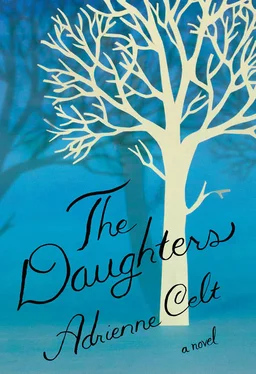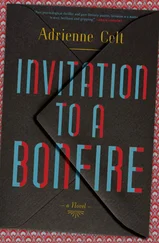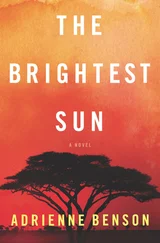“Although. ” Sweat dripped from every inch of her skin, but still, when the stranger spoke, Greta froze. She looked up to see him wearing a thoughtful expression. “It does seem like a shame.”
Greta waited. After a minute she asked, “What does?”
“Or a waste , really.” The man began strolling around the hole, his hands folded neatly behind his back. “A beautiful girl. A terrible tragedy.”
“I don’t know.” Greta looked at the small, still child and wanted with every fiber to be able to breathe her own life into that body. But what she said was “It happens all the time.”
The man wasn’t listening.
“And of course sons are nice, lovely really, but they’re not the same for a woman. I can see you holding a little girl in your arms. I can picture it.” The man sighed. “Oh, clearly. Very clearly.”
He walked over to the baby, lying in a bed of grass where Greta had left her. The blanket was wrapped tightly around the child, folds tucked cleverly under folds so that the whole package was as smooth as a pillowcase. Crouching on his heels, the stranger picked up the baby and cradled her in his elbow. Greta sucked in a breath. But what could he do that hadn’t already been done?
“Yes,” the man said. “I wonder if we don’t have something to offer one another, you and I.” He rose back up, still holding the bundle. “After all, I hate to see you so lonely.”
He stood at the lip of Greta’s hole and looked down at her. Her shoulders tightened.
“Because you are lonely, aren’t you?” he asked. “You have a little family. All those little men. But how happy can you be? With this?”
The man tilted his chin to the cold form of the baby.
“I can offer you the child you really want,” he continued. “The child you dream of. You do still dream of her, don’t you?” He smiled his thin smile again and nodded. “Often. Yes. It would be a good trade.”
In her half-dug grave, Greta’s ankles were freezing cold. She tried to call up an image of Andrzej’s face, then Fil’s, then Konrad’s. But she couldn’t.
“What do you mean, a trade?”
The man looked up into the distance as if calculating a very large number.
“I really dislike waste, you know. Can’t stand it. Everything has a use if you look for it. But most people don’t look, do they?”
Greta scowled. “You’re talking in riddles.”
“I am, aren’t I?” The stranger scratched his ear. “Please forgive me. It’s just that I get caught up in my own ideas and I forget what I have and haven’t said out loud. What I mean is very simple. You want a daughter, and you should have one. And she”—he looked now into Greta’s eyes with a frankness that seemed to fix her in place—“she should really have a daughter too. And her. And her.”
He moved the baby so that she lay with her face against his shoulder.
“I’m not sure I understand you,” said Greta. But the man was no longer paying any attention to her, caught up as he was in the details of his idea. He seemed to forget that he’d begged her forgiveness for this very sin not a moment ago.
“And the beauty of it is,” he continued, “you don’t even have to say yes. All you have to do is not tell me no. For a little while, you might think you’ve dreamed this. Oh, you’ll try to convince yourself. Or you’ll think I was a madman in the woods. You’ll think, sometimes, that you’ve caught a glimpse of me — in a window or on a busy street. But you don’t have to worry. I won’t be checking up on you.” He tugged his earlobe. “No need.”
Greta’s fingers tightened around the shovel. The day, she realized, had grown dark, and the sky now seemed to be threatening rain.
“What are you going to do?”
“I told you. Or did I?” The man frowned. “It’s just a simple trade. I take a few things that you don’t need — a few things I’d like to have — and you get something in return. Something you want very much. Doesn’t that seem fair?”
A drop fell from the sky onto Greta’s cheek. The stranger looked up at the clouds.
“You’d better hurry,” he said. “There isn’t much time to decide.”
“All right,” said Greta. Before she knew what she was doing.
“Really?” The man scraped a nail along the edge of his bottom lip. “You’re sure?”
Greta nodded. Another few raindrops fell on her shoulders, a few on the top of her head and her hands.
“Well, good then.” The man turned and walked towards the woods, then looked back at Greta. “I won’t see you again, you know.” When she didn’t reply, he stepped into the trees, picking his way through the underbrush until he was gone.
A moment passed and the rain began to drum against the ground in earnest. Then Greta’s heart wrenched. The baby. He’d taken the baby with him.
“Wait!” Greta tried to pull herself out of the hole, but the dirt was turning into mud and she slipped and scrambled against it. “Wait!” she cried.
But her voice echoed into nothingness. When she finally managed to get out of the grave, the clearing was empty. There was no one in sight, no matter which direction she turned. Just trees, which looked spindlier and more identical as they receded. Her shawl lay empty on the earth.
Greta sat down and sobbed into her hands. Her whole body was covered in mud, and it slurred into her eyes, so everything looked brown and dead. She waited. Time passed and nothing changed, except that she blinked out the mud and wiped her nose on the back of her hand.
The man was gone. And he wasn’t coming back.
Little knowing what else to do, Greta filled in the hole she’d dug. And as strange as it was, with every shovelful she threw down, she felt her fury recede. As if she weren’t lifting dirt from a mound but from her own shoulders. A weight from her mind. When she was done, she marked the place with a cross of stones and paused to appreciate it. No one would ever know the difference. Maybe , she thought, I’ll forget too.
But she never did.
“Lulu.”
Over the phone I can hear my mother light a cigarette, take a drag. Pause and spit a flake of tobacco off her tongue. She doesn’t say anything but my name, and that’s enough. As always, her voice sounds like it’s kept on packed ice. Winter breathing off the water, ice crystallizing on your eyelashes as you stroll the last block home. A Billie Holiday voice, scratchy muslin that touches your skin even before it reaches your ears.
“Mama, I—” My own voice catches. “I was just. ”
On the other end of the line, she shifts. I can see her lifting her arms to the lights in the jazz bar. Sipping a glass of wine with her legs crossed, dainty, at the ankles. All the poses she made in my childhood, flitting in front of my eyes like a deck of cards. So many of the cards are blank though. Black.
“Lulu,” she says again. “What?”
A fair question. I cast around for common ground: history, geography. “I’m near the Green Mill,” I say. The bar is, in fact, close by. “I was just thinking of you.”
I’m surprised to hear her laugh.
“Well, first time for everything, isn’t there?”
This is fair too — or almost. And it hurts. The bookstore is quiet around me — I can hear the scratching of the man’s pencil behind the counter, the occasional flip of a page, but I’m the only real disturbance. Kara has settled down and blinks, her nose rooting around my collarbone. I should feed her soon. I keep forgetting that my time is not my own.
“Don’t be mean,” I say.
“Am I?” Sara laughs again. I can feel it in my body, like a punctured lung. “If I’m not very much mistaken, you called me. I don’t see how that obligates me to all the pleasantries.”
Читать дальше












